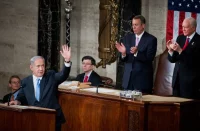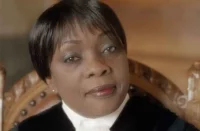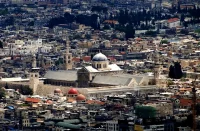By Elena Suponina (Russia)
The New Year began with a remarkable visit by Dmitry Medvedev to the Middle East. Russia’s President visited Jordan and the Palestinian Authority, and his trip coincided with the Christian holiday of Epiphany, which is celebrated on January 18-19. John the Baptist baptized Jesus Christ in the waters of the Jordan, and Medvedev symbolically visited the banks of that river during the holiday.
The initial plan was to make Israel the first and most important stop on his tour. But a strike by Israeli diplomats demanding higher wages disrupted the long-planned visit two weeks before it began. The Kremlin accepted an apology from the Israelis, but without enthusiasm. It turned out to be symbolic in the end because Medvedev began his first foreign talks of the New Year with statements of support for Palestinian independence.
In Russian Foreign Minister Sergei Lavrov’s first press conference of the New Year, he found it necessary to deny allegations by some political analysts that Medvedev’s trip to the Palestinian Authority was retaliation for Israel’s cancellation of his visit. He even called the allegations a “bad provocation.” Lavrov explained that the talks with the Palestinians had been planned from the beginning. In fact, the route of his Middle East tour had been announced in advance. However, the earlier theme of a brief trip to the Palestinian Authority and the visit to Jordan were lost in talk about the grandeur of prospects for cooperation with the Jewish state. And talks with the Arabs moved to the forefront after the controversial cancellation of the visit to Israel.
As soon as Medvedev’s visit to Israel’s neighbors ended, Israeli diplomats for some reason rushed to say that it was a routine affair. Commenting on Medvedev’s statements about Palestinian independence as quoted in the press, Israeli Foreign Ministry spokesman Yossi Levy said they “contain nothing new.” The continuing strike obviously affected that assessment because the Israelis usually pay closer attention. In fact, a great deal that was new did happen during the trip.
For the first time Medvedev visited Palestine not just as an authority within Israel, but as an independent territorial entity, although previously its status was unclear and its borders ill-defined. “This is the first visit of a Russian Federation president to the region and to the Palestinian territories that is not connected to a visit to a neighboring country,” said Medvedev at a press conference in the Palestinian city of Jericho in the West Bank. The Russians arrived there on January 18 in a motorcade from the airport in neighboring Jordan, and they returned to Jordan for talks with its King (Palestine currently has no functioning airport). Until now, a visit to the Palestinian Authority has always been part of visits to Israel, and guests always held talks with Israel’s leaders first. It was supposed to have been that way this time but the Israeli strike caused a revealing change in the route.
Medvedev said that Palestine today is a “corporate entity,” although it “has yet to make the rest of the journey towards establishment of an independent state.” Palestinian Prime Minister Salam Fayyad said that it is planned to complete reforming the power ministries and develop the infrastructure for autonomy to the point where they can function as an independent state by August.
Palestinian National Authority President Mahmoud Abbas explained that he considers September the deadline for achieving Israeli agreement on Palestinian independence. He referred to a statement by US President Barack Obama at the United Nations General Assembly session on September 23, 2010. Obama said, “If we [reach for what’s best within ourselves], when we come back here next year, we can have an agreement that will lead to a new member of the United Nations—an independent, sovereign state of Palestine, living in peace with Israel.” Prior to that, however, on March 19, 2010, the Quartet of international mediators (Russia, the United States, the European Union and the UN) had decided at a foreign ministers’ meeting held in Moscow that it would do everything possible to establish the new state within 24 months, or in other words by the end of March 2012.
“From the establishment of a Palestinian state, everyone will benefit,” Medvedev said during his trip, explaining that he was thinking of both Arabs and Jews. Otherwise, he indicated, a worst-case scenario could develop. “There are two options, either peace or terror and violence. We shall not choose terror and violence,” he said.
However, the Israelis have given the Palestinians only a portion of the territory they captured during the 1967 war. There are still Jewish settlements in some areas. At a press conference in Jerusalem, Medvedev called on the Israelis to “freeze settlement activities in the West Bank and in East Jerusalem.” He made that appeal the day the Arabs put forward a draft UN Security Council resolution condemning the Israelis for continuing to build settlements. Mahmoud Abbas expressed hope that the United States would not exercise its right of veto in voting on the document.
To put additional pressure on Israel, several countries are now renewing their call for recognition of the rights of the Palestinians to self-determination. President Medvedev indicated in discussions with the Palestinians and Jordanians that it would be superfluous to expect that from Moscow because Moscow had spoken out in favor of it when it was part of the Soviet Union. In November 1988, the Palestinian National Council (the parliament in exile) announced at a meeting in Algeria that it was establishing an independent Palestinian state adjacent to Israel. Moscow immediately recognized that “virtual” independence. “Russian made its choice long ago, at the end of the 1980s. We supported and will support the inalienable right of the Palestinian people to create its own state, which is independent, territorially integral and with a capital in East Jerusalem,” Medvedev said at a joint press conference with Mahmoud Abbas in Jericho.
Medvedev’s visit will be useful for the meeting of the Quartet of Middle East mediators scheduled for the first week in February. It will take place at the high representative level in Munich as part of the annual international conference on security. Medvedev’s visit to the Middle East demonstrated that none of the major powers plans to deviate from the course towards an independent Palestine.
The presidential visit was about more than high politics. Several agreements were signed in the Palestinian Authority. Palestinian Ambassador to Russia Fayed Mustafa, who was present at the talks, listed them in an interview with New Eastern Outlook: “A memorandum of understanding between the parties, a cooperative agreement between the ministries of agriculture, a similar document between the Olympic committees and an agreement between the RIA Novosti and Wafa news agencies.”
In Jordan, the parties discussed prospects for participation by Russians in building the country’s first nuclear power station. Results of the second round of bidding are expected this spring; the bidders include Canadians and a Japanese-French consortium. In December 2009, the Russians lost a bid to South Korea for the construction of a research reactor in Jordan. The chances of success this time are better.
Also concluded were a memorandum of cooperation between our energy ministries and a protocol on energy projects by the state-owned company Zarubezhneft. They involve cooperation with the Jordanians in exploring for oil and gas in their country and developing alternative energy sources. The Russian Embassy in Jordan also told me the Jordanians would like to buy wheat from Russia. An agreement to that effect was put together last year with one company, but drought and fires in Russia limited grain exports, so the idea had to be postponed.
In addition, during a visit by then President Vladimir Putin in February 2007, agreements were reached for the joint establishment of two factories in Jordan to assemble VAZ automobiles and Ka-226 light multi-purpose helicopters. Russians also assisted the Jordanians in setting up licensed production of rocket launchers. Meanwhile, trade between Russia and Jordan fluctuates around the small sum of $400 million per year. However, that does not include military-technical cooperation, an area in which King Abdullah II has shown a great deal of interest.
Medvedev’s visit to Palestine and Jordan not only had an unusual beginning, its conclusion was also out of the ordinary: Russia’s President bathed in the Jordan River on the Day of Epiphany, January 19. Following Orthodox tradition, he plunged his head three times into the river at the very place in Jordan where archaeologists believe John baptized Jesus 2000 years ago. All of the journalists and most members of his delegation were absent when he did it. However, New Eastern Outlook has learned that President Medvedev donned a peasant shirt especially made for the occasion to perform the rite.
The President’s baptism was also an important symbol that in recent years Russia has returned to the Holy Land—not just to the Middle East. When Russian leader Vladimir Putin made his first visit to the region in April 2005, he went straight from the Tel Aviv Airport to the Holy Sepulcher in Jerusalem. As a journalist who accompanied him on that trip, I remember very well how he genuflected before Calvary.
 Medvedev followed the tradition of visiting holy places. Moreover, with the support of the Office of Presidential Affairs, several structures were built for his visit using money from our country on land it owns. They became new symbols of Russian-Arab friendship and symbols of Russia’s presence in the Holy Land. They were a museum and park complex in Jericho in the West Bank (which is why Jericho was chosen as the site for the talks) and the Russian Pilgrim’s House on the east bank in Jordan.
Medvedev followed the tradition of visiting holy places. Moreover, with the support of the Office of Presidential Affairs, several structures were built for his visit using money from our country on land it owns. They became new symbols of Russian-Arab friendship and symbols of Russia’s presence in the Holy Land. They were a museum and park complex in Jericho in the West Bank (which is why Jericho was chosen as the site for the talks) and the Russian Pilgrim’s House on the east bank in Jordan.
In both instances, the construction was done on land belonging to Russia. Even before Putin’s visit in 2007, King Abdullah had donated one hectare of Jordanian land in a protected area at the baptism site of Jesus Christ to the Russian Orthodox Church in perpetuity. And in the Palestinian Authority, Russians in cooperation with local authorities have in recent years been reclaiming lands that once belonged to the Church and the family of the Czar because ownership of some of them were lost during the vicissitudes of the revolution.
In old Jericho, in particular, the Russians have just built a museum on the history of ancient Palestine containing exhibits of some items discovered by Russian archaeologists. And Russian botanists have cured a weathered and termite-infested fig tree growing in the complex, a revived witness to the acts of Jesus Christ. Zacchaeus the tax collector was a short man who climbed a tree so that he could better see Jesus as he passed in a crowd of curious onlookers. And now Mahmoud Abbas and Dmitry Medvedev have jointly decided that the tax collector who later became famous for his charity sat under the spreading branches of the tree that Russians saved from dying in our time and that has even burst into leaf again.
Elena Suponina is a Russian Orientalist, a political analyst.
Source: New Eastern Outlook














I can understand Sergei Lavrov’s problem. He must know that his country played ‘midwife’ to Israel. Unfortunately, instead of building the new colonial entity a ‘socialist state’ on Russian model – the Zionist leaders preferred American capitalism. So Moscow became the second western country which recognized the Zionist entity in May 1947. First, naturally, was Washington. Israel’s first president Dr. Chaim Weisman was leader of Russian Socialist Party.
Dmitry Medvedev visited the West Bank ruled by pro-USrael Mahmoud Abbas, a double agent, whose electoral mandate expired on January 7, 2009 and who is ruling by decree since then. The russian President, like the rest of the Zionist western leaders, avoided to meet the democratically elected government of Hamas in the Gaza Strip. That shows how honest Dmitri is when it come to Palestinians’ interests.
http://rehmat1.wordpress.com/2011/01/22/palestinians-the-enemies-within-and-outside/
Pingback: The Sino-Russian Alliance Comes Of Age (I) – OrientalReview.org – DE LA GRANDE VADROUILLE A LA LONGUE MARGE